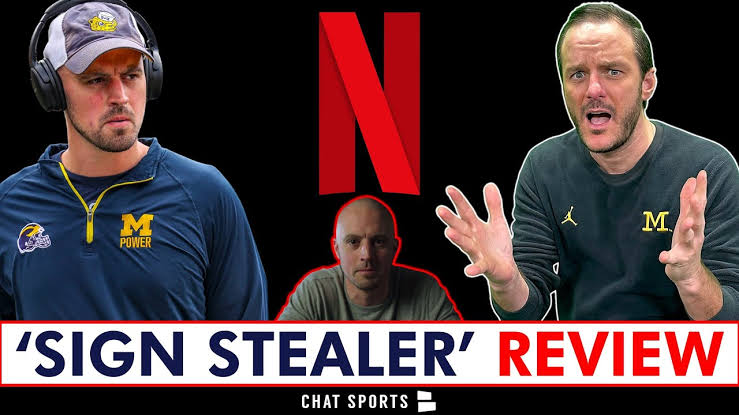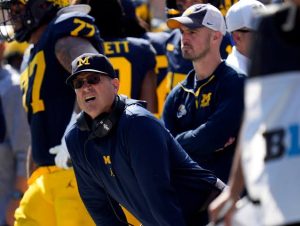
Netflix’s Untold: Sign Stealer dives into one of the most controversial scandals in college football history—the Michigan Wolverines’ 2023 sign-stealing controversy.
At the center of this issue is Connor Stalions, a former Michigan football staffer who allegedly orchestrated a scheme to steal opponents’ signs to gain a competitive advantage. The documentary offers an in-depth look at how the controversy unfolded, Stalions’ role in the plot, and the broader implications of such actions within the world of college football.

The Rise of Connor Stalions
Connor Stalions was a relatively unknown figure in the college football world before the 2023 sign-stealing controversy. A former walk-on football player at the Naval Academy, Stalions found his way into coaching, eventually landing a job as a low-level analyst for Michigan’s football program. His journey from an obscure assistant to the center of a nationwide scandal is a testament to how college football’s obsession with competition and winning can lead to questionable decisions.
Stalions, who was involved in scouting and analyzing game tape, allegedly took things a step further. According to sources, he devised a plan to steal signs used by opposing teams, which involved sending scouts to film opponents’ sideline signals during games.
These scouts would then provide the footage to Stalions, who would analyze it to decode the opposing team’s playcalling system. With this information, Michigan’s coaches and players could predict plays in advance, gaining a significant advantage on the field.
The Scheme Unraveled
The documentary tracks the events leading up to the scandal breaking into the public eye. In 2023, an investigation by the NCAA and other governing bodies of college football revealed the extent of the sign-stealing operations.

Reports surfaced that Michigan had not only stolen signs from conference rivals, but had also gone as far as sending scouts to away games to film opponents’ signals. This revelation raised alarms about the ethical boundaries of competition in college sports.
Initially, the Michigan football program denied involvement in any such scheme, but the evidence quickly mounted. Video footage, testimonies from former staff members, and interviews with anonymous whistleblowers shed light on the operation’s depth. The scandal ignited a firestorm in college football, with many fans, analysts, and coaches questioning how far programs were willing to go to ensure success.
The NCAA launched an official investigation into Michigan’s football program, and the media quickly picked up the story. The larger issue of sign-stealing, which had long been an open secret in college football, now found itself under intense scrutiny.

While sign-stealing itself is not necessarily illegal in college football, the methods Michigan allegedly used—sending people to rival teams’ games to film signals—raised serious concerns about the integrity of the sport.
The Fallout and Stalions’ Role
Untold: Sign Stealer presents Connor Stalions as the central figure in this controversy. The documentary paints a picture of a man driven by a desire to see Michigan succeed at any cost. Through interviews with former colleagues and experts, Stalions is depicted as a meticulous, detail-oriented individual who believed that sign-stealing was just another part of the game.
However, the documentary also hints at the moral ambiguities of his actions. Was he simply following orders from higher-ups in the program? Or did he take matters into his own hands in an attempt to cement his legacy in college football?
The documentary also explores the pressure that coaches, players, and staff experience within the highly competitive world of college football. As schools spend millions of dollars on their programs, the expectation for coaches to deliver victories becomes overwhelming. This creates an environment where cheating and bending the rules are often rationalized as a necessary evil to achieve success.
For Michigan, the sign-stealing scandal was a significant blow. The university’s athletic department had long prided itself on maintaining a reputation for integrity, but the allegations against the football program tarnished that image.
As the investigation unfolded, the Michigan coaching staff, including head coach Jim Harbaugh, found themselves under intense scrutiny. While Harbaugh has denied any direct involvement, the documentary suggests that Michigan’s leadership may have been more aware of Stalions’ actions than they initially let on.
Broader Implications
The Untold: Sign Stealer documentary is not just about one man’s role in a single scandal—it’s a window into the larger issues plaguing college football. The sign-stealing controversy speaks to a broader culture of win-at-all-costs mentality that permeates the sport. It raises questions about the lengths to which programs are willing to go to gain an advantage, as well as the ethical lines they are willing to cross.

Sign-stealing is not a new practice in college football. Coaches have long used various methods to decipher their opponents’ playcalling systems. However, the level of organization and sophistication alleged in Michigan’s case marks a new low for the sport. The documentary explores the blurred line between what is considered fair game in football strategy and what constitutes cheating.
As the investigation into Michigan’s sign-stealing scandal continues, the larger conversation around the integrity of college football has taken center stage. The sport’s governing bodies are being forced to reckon with the reality that sign-stealing and other similar practices are commonplace at many top programs, leading to calls for stricter enforcement and clearer regulations.
Conclusion
Untold: Sign Stealer takes a deep dive into the Michigan Wolverines’ 2023 sign-stealing scandal, offering viewers a detailed look at the events that led to one of the most high-profile controversies in recent college football history.
The documentary not only sheds light on Connor Stalions’ role in the scheme but also examines the larger issues of competition, ethics, and the pressures faced by those involved in college athletics. As the scandal continues to unfold, the documentary serves as a reminder of how far some will go to win and the lasting consequences of crossing the line in the pursuit of victory.






